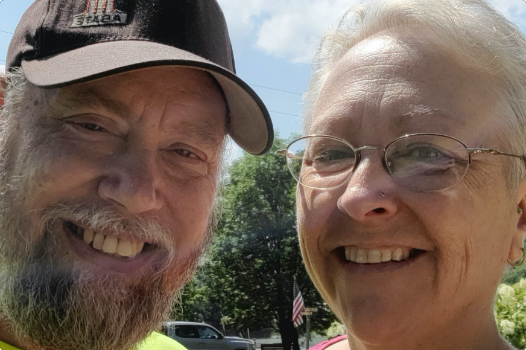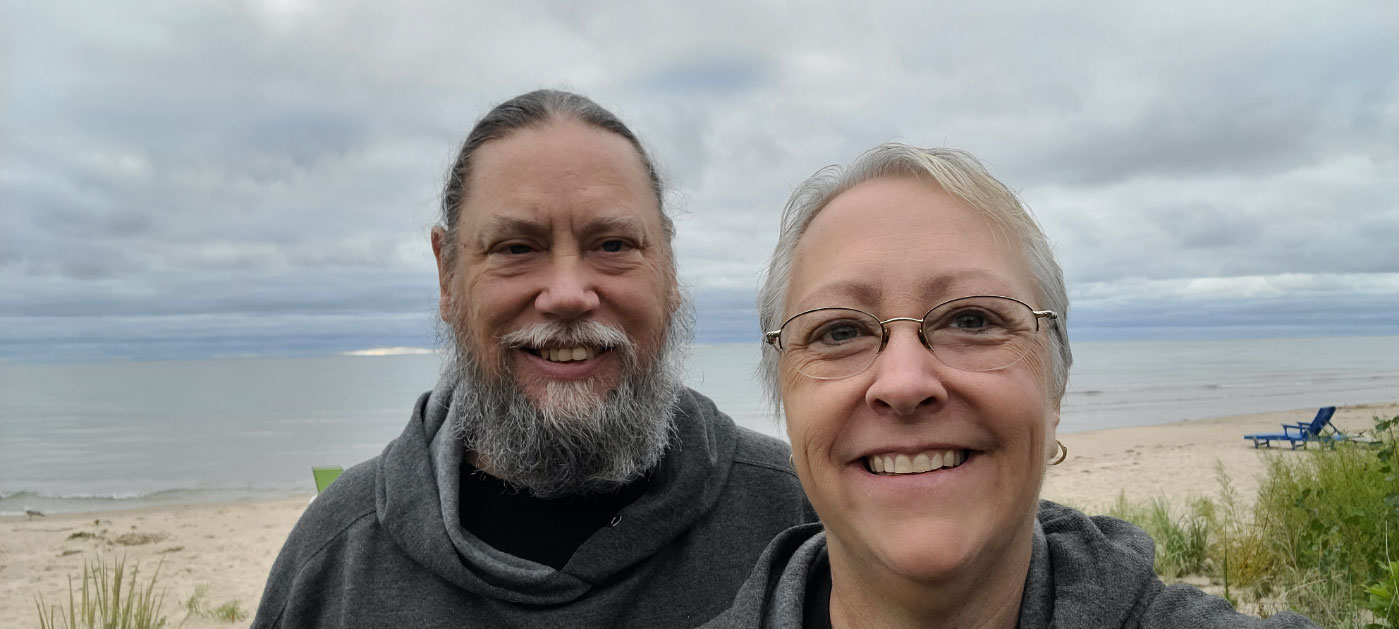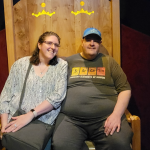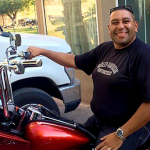In Sickness. In Health. In Love.
Jimmie & Dawn are in it together.
*Dawn is a NxStage Patient Advocate
Last February, Atlas readers met a couple who fell in love after being introduced at their dialysis clinic in 2018. For 2021, love is in the air again, this time with a story that started 40 years ago.
Dawn and Jimmie’s friendship began when they were just a couple of kids in junior high. They stayed close through the high school years, but after graduation their lives took different paths. Twenty-five years later, in 2009, fate saw them reconnect. Dawn was recently divorced; Jimmie had never married. Sparks flew and a “whirlwind romance” followed, says Dawn. Five months later, they were saying “I do.”
For Dawn, it meant more than becoming Jimmie’s wife; it was also a commitment to be his care partner. Less than a year before their marriage, Jimmie had crashed into dialysis, the result of chronic, genetic high blood pressure that had gone unchecked.
Dawn remembers Jimmie asking if she knew what she was getting herself into, marrying an ESRD patient.
“I had been in healthcare most of my life,” says Dawn. “I said, ‘Oh yeah, sure.’ But I had no clue!”
Jimmie was in-center when the couple got married. Though in his early forties, he says dialysis made him feel “kind of old and used up.” Dawn and one of his nurses convinced him to take part in a program called Experience the Difference, which enables patients to try more frequent home hemodialysis (HHD) therapy at their clinic, using a NxStage system.
“It was a good thing,” says Jimmie. “I didn’t feel as wiped out, and after couple of days on more frequent HHD I saw improvements in my blood pressure and it got back closer to normal.* It hadn’t been that way for a really long time. We set up our HHD training the very next week.”
After five weeks of training, the couple was able to bring Jimmie’s dialysis therapy home. Dawn said they felt confident in their abilities and in their care team.
“Our nurses were awesome,” she recalls. “One time I called them at 2 a.m. and I was so frustrated. The nurse kept asking questions and helping guide me through it. Finally, she asked ‘Is your door unlocked? I’m right outside and I’m here to help.’
Jimmie felt good doing more frequent HHD, but was still waiting for a transplant opportunity. After tragedy struck his family, and his cousin suddenly passed away, Jimmie received that opportunity.
The surgery was a success and to celebrate new beginnings, Dawn took Jimmie to a motorcycle rally in Daytona, Florida. Unfortunately, the hopefulness they felt would prove to be fleeting.
In 2016, Jimmie started to feel sick. It started with severe gastrointestinal issues and dramatic weight loss and got worse from there. He experienced two acute rejections, and in 2017 ended up in a fight for his life due to bacteria-induced sepsis.
“That was a pretty scary time,” Dawn remembers, with tears in her eyes. “We are a ‘We.’ When Jimmie goes into the hospital, I don’t leave until he leaves.”
Dawn spent weeks at Jimmie’s bedside while he fought to stay alive. She says she was never so grateful than on the day he went back on dialysis, putting the failed transplant behind them. After eight days of retraining on HHD, they were home again.
“I feel great!,” says Jimmie, who dialyzes seven days a week and often walks five miles a day. “If I’m on that machine every day I feel better. I personally have no dietary restrictions. In fact, the doctor told me I need more potassium in my diet, which is very odd for a dialysis patient.”

Now in their mid-50s, they “do everything together” from taking walks to riding motorcycles; spending time with family to homeschooling two of their 13 grandchildren during the pandemic. The couple even got tattoos to express their love – Jimmie has an angel and “Dawn” on his right arm and Dawn wears a morning dove with Jimmie’s name around her left ear because “he’s always whispering in my ear.”
Beyond being there for one another, Dawn and Jimmie do whatever they can to help others facing the challenges of kidney disease and dialysis. Dawn is a NxStage Patient Advocate who travels to clinics and other locations to share their experience and educate patients about more frequent HHD, and also facilitates support groups for home patients and their care partners.
“Anything I can do for the kidney community, I’m all about it,” says Dawn. “I don’t care if we have a houseful of kids. If I get a call I don’t say ‘where?’ or ‘when?’ I say ‘Yes!’”
When asked what drives her, Dawn’s answer is simple and heartfelt.
“I’ve seen Jimmie at his worse, and I’ve seen how more frequent HHD has helped him to live his life on his terms,” she says with conviction. “Life is too short. We do not live our lives for dialysis; we do dialysis so that we can live our lives. I just want people to know how great this therapy has been for us.
Looking down the road, Dawn and Jimmie plan to retire and leave their home behind in favor of RV life. They see an opportunity to connect with family, revisit favorite destinations such as the Florida Keys, and see parts of the country they’ve never been to. Colorado, Arizona, Texas and other areas are already on their short list.
“It’s going to be an adventure for sure,” says Dawn.
*Patients should review the following information carefully and discuss it with their doctors to decide whether home hemodialysis with NxStage systems is right for them.
Users should weigh the risks and benefits of performing home hemodialysis with NxStage systems.
- Medical staff will not be present to respond to health emergencies that might happen during home treatments.
- Users and their care partners will be responsible for all aspects of their hemodialysis treatments from start to finish.
- Users may not experience the reported benefits of home, more frequent or nocturnal hemodialysis with the NxStage systems.
- The NxStage systems require a prescription for use.
Certain forms of home hemodialysis have additional risks.
- If a doctor prescribes more frequent home hemodialysis, vascular access is exposed to more frequent use which may lead to access related complications, including infection of the site. Doctors should evaluate the medical necessity of more frequent treatments and discuss the risks and benefits of more frequent therapy with users.





